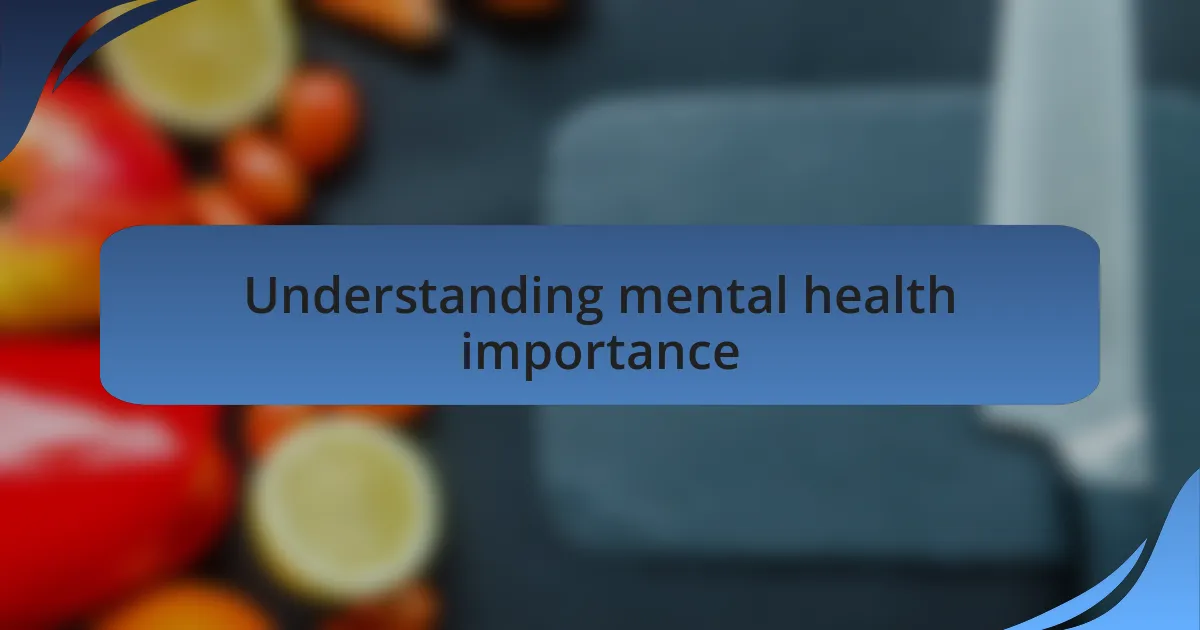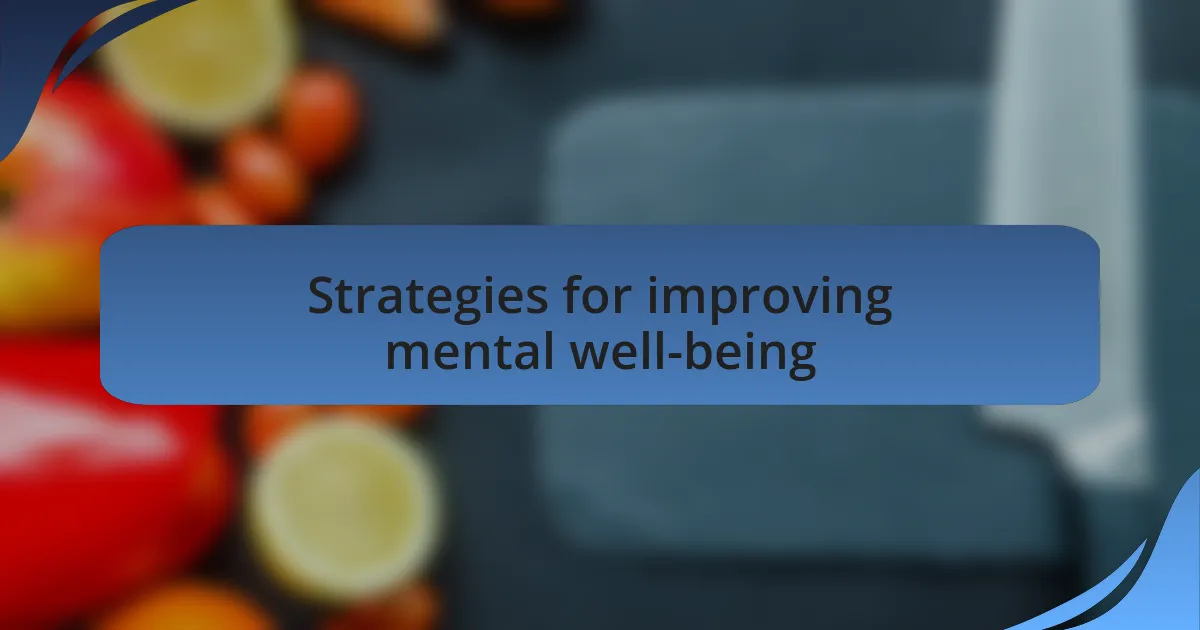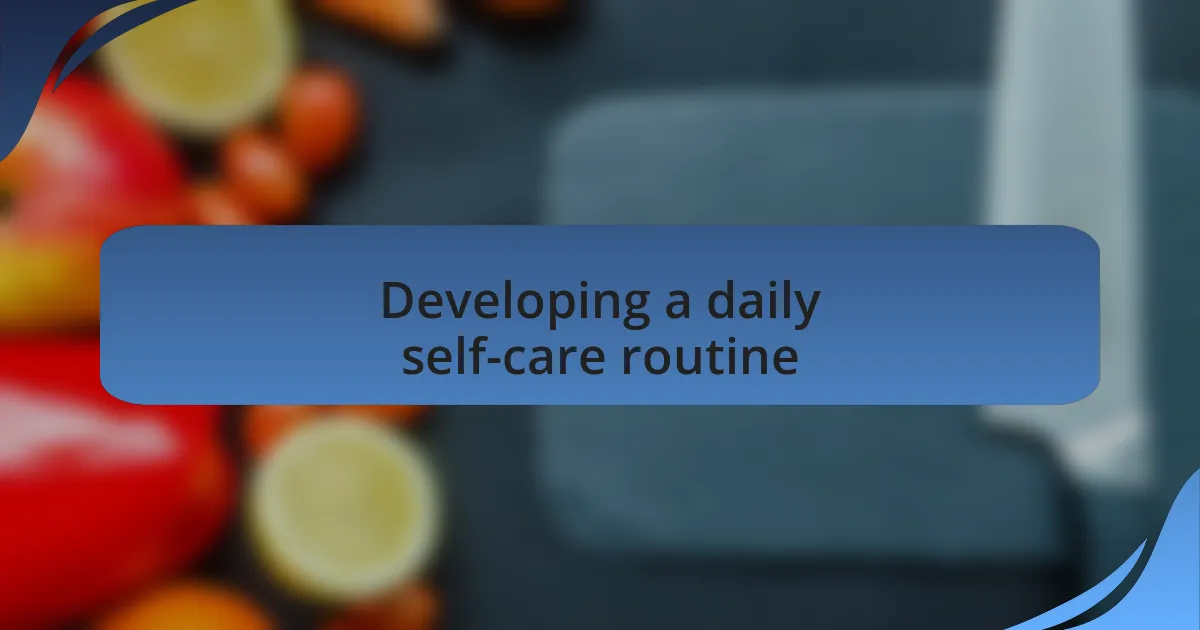Key takeaways:
- Mental health is essential for overall well-being, affecting emotions, relationships, and physical health.
- The Covid pandemic heightened feelings of anxiety and depression, prompting a need for self-reflection and support.
- Establishing a daily routine, practicing gratitude, and engaging in physical activity can significantly improve mental well-being.
- Sharing personal struggles fosters connection and community, transforming burdens into opportunities for growth.

Understanding mental health importance
Mental health is fundamental to our overall well-being, affecting how we think, feel, and act. I remember a time when I felt overwhelmed by stress, believing I could simply push through it. It wasn’t until I acknowledged my mental struggles that I realized how deeply they impacted every aspect of my life—my relationships, work performance, and even my physical health.
Without understanding the importance of mental health, we often overlook the subtle signs of distress that may lead to significant challenges. Have you ever noticed how a single negative thought can spiral into a cloud of anxiety? I have experienced this firsthand; taking the time to recognize and address these thoughts changed my perspective entirely and allowed me to reclaim control over my emotions.
The societal stigma surrounding mental health can make it feel taboo to seek help, but acknowledging its significance is a powerful first step. I once hesitated to speak about my own mental health struggles, fearing judgment. Yet, opening up not only alleviated my burden but also fostered deeper connections with others. When we understand and prioritize mental health, we create a foundation for a healthier, more fulfilling life.

How Covid impacted mental health
The pandemic shook the world in ways we never expected, particularly regarding mental health. I remember feeling a sense of uncertainty that loomed over my daily life. It was more than just the worry of getting sick; the isolation, lost routines, and social distancing turned usual coping mechanisms into distant memories.
Many of us experienced a surge in anxiety and depression as lockdowns stretched on, leaving us to navigate our feelings largely alone. Personally, I found solace in online communities, but even that couldn’t fully replace the in-person connections I craved. It’s strange to think how the very technology that brings us together can also highlight our isolation; have you felt that contradiction too?
I’ve also noticed how the pandemic forced me to confront my mental health in ways I’d avoided before. With the world slowing down, I finally had time to reflect on my thoughts and emotions. At first, it felt overwhelming, but in those moments, I discovered the power of vulnerability and the importance of reaching out for support. It prompted me to ask, how often do we allow ourselves to sit with our feelings rather than rush past them? For me, the journey to better mental health truly began when I was willing to take a step back and confront this reality.

Strategies for improving mental well-being
When it comes to improving mental well-being, I found that establishing a daily routine has been incredibly effective. During the chaos of the pandemic, I struggled with the lack of structure. By setting specific times for work, exercise, and relaxation, I created a rhythm that helped me regain a sense of normalcy and control. Have you tried putting a routine in place? It can really transform your days.
Another strategy that brought me unexpected joy was practicing gratitude. Each night, I would write down three things I was grateful for, even in difficult times. This simple exercise shifted my focus from what I lacked to the positivity still present in my life. It was heartwarming to see that even on tough days, there were still little moments that sparked joy. Have you considered making a habit of gratitude? You might be surprised at how it uplifts your spirit.
Lastly, I can’t emphasize enough the impact of physical movement on mental health. I started going for daily walks, and it turned out to be my favorite form of therapy. The fresh air and rhythm of my steps helped clear my mind, while that time outdoors connected me to the world. Have you ever noticed how being active can shift your mood? It’s a powerful reminder that self-care doesn’t have to be complicated—it can be as simple as taking a walk.

Developing a daily self-care routine
Developing a daily self-care routine has been a game-changer for me. At first, I thought self-care was just a luxury, but as I began to prioritize small rituals—like making my bed each morning or sipping herbal tea in the afternoon—I realized how much these moments grounded me. It’s amazing how little acts can create a sense of accomplishment and calm.
One of the most profound additions to my self-care routine has been time spent outdoors. I dedicated at least 10 minutes daily to simply breathing in the fresh air and soaking in natural light. On some days, I’d close my eyes and let the warmth of the sun envelop me. Have you tried consciously incorporating nature into your day? I found that these brief moments not only lifted my spirits but also created a refreshing interlude in my busy schedule.
I’ve also learned to listen to what my mind and body crave. Some days call for a cozy evening with a good book, while others might need an energizing workout. The important part is tuning in and giving myself permission to adjust my routine based on how I feel. How often do we forget to check in with ourselves? This simple practice has cultivated deeper self-awareness and strengthened my overall mental well-being.

Sharing my personal journey
Sharing my personal journey has been incredibly cathartic for me. I initially hesitated to open up about my struggles, fearing judgment or misunderstanding, but once I started sharing my experiences, I discovered a remarkable sense of connection. It was during a virtual support group session that I truly felt the power of vulnerability—not only did others resonate with my story, but it encouraged them to share their own, creating a supportive community where none of us felt alone.
There was a pivotal moment when I realized the importance of sharing for my mental health. I remember standing in front of my mirror one evening, feeling particularly low, and deciding to voice my feelings aloud. It felt strange at first, almost awkward, but as I spoke, the weight of my thoughts began to lift. I often wonder, has speaking your truth ever lightened your emotional load? For me, releasing those bottled-up feelings proved essential to my healing journey.
Engaging in storytelling transformed how I viewed my struggles. Instead of seeing them as burdens, I learned to frame them as stepping stones toward growth. I began to express my story through writing, documenting my highs and lows, and what struck me most was receiving messages from friends sharing how my experiences inspired them. This two-way interaction not only enriched my journey but fostered a sense of purpose that fueled my ongoing commitment to better mental health. What about you—have you found solace in sharing your journey?